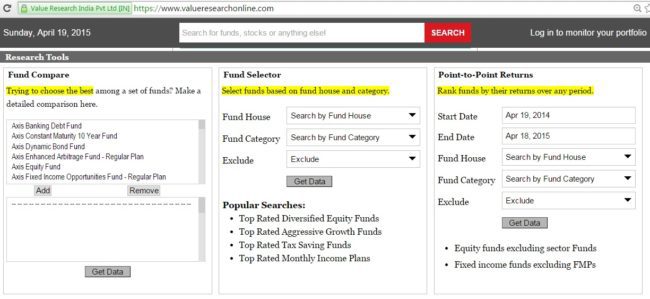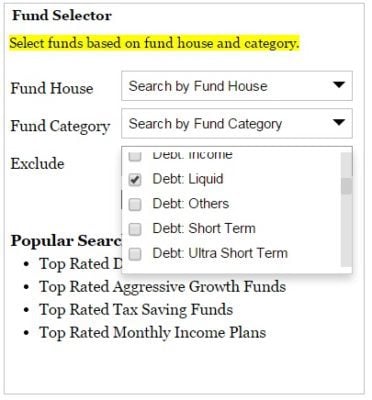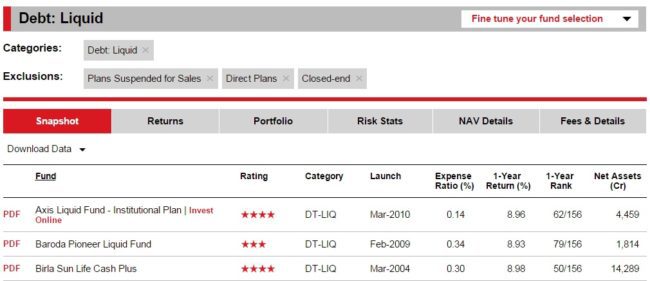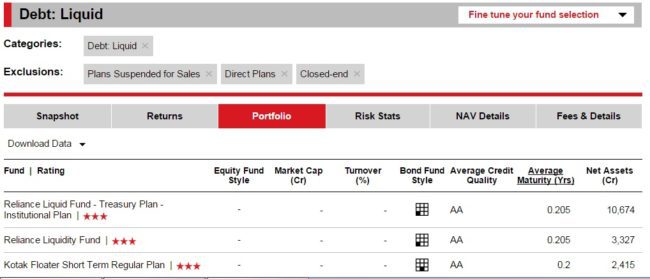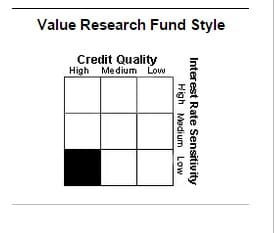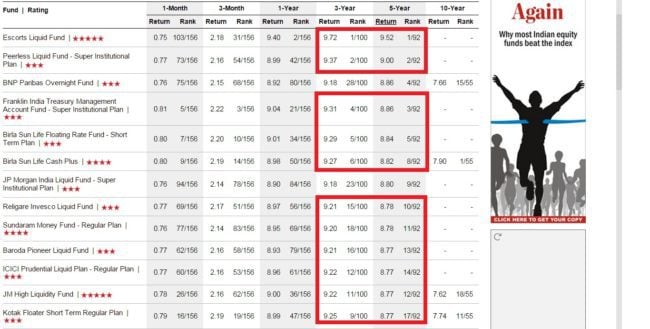Last Updated on January 10, 2016 at 6:49 pm
Here are step-by-step instructions for choosing a liquid mutual fund. This post is inspired from a comment by Firoz Hajiani. I think the following steps might help the reader become familiar with some of the aspects that govern debt fund selection.
The first question to answer is,
Why choose a liquid fund?
Many ‘experts’ suggest that liquid funds as an alternative to a savings bank account for ‘idle money’. In my opinion, this is half-baked advice that can be misconstrued.
Join 32,000+ readers and get free money management solutions delivered to your inbox! Subscribe to get posts via email! (Link takes you to our email sign-up form)
🔥Want to create a complete financial plan? Learn goal-based investing? Exclusive access to our DIY tools? Increase your income with your skills? Enjoy massive discounts on our robo-advisory tool & courses! 🔥
If someone has money idling then they must be urged to holistically look at they way they manage money and not offer liquid funds as a piece-meal solution.
There are others who suggest that liquid funds be used for emergencies. Sure, a part of the emergency corpus can be stashed in a liquid fund, but not all of it. Liquid funds are not as liquid as they are made out to be. Redemptions can take up to 2 days. Those with ATM cards tagged to them have withdrawal limits.
Then there are others who use liquid funds for tactical asset allocation. When the market is overvalued (how that is measured in the first place, is another matter), they keep cash in a liquid fund and switch to equity funds when the time is ‘right’.
Very few use it for short-term goals. Which is a good idea even if there is no tax benefit compared to FD or RDs for less than 3 year periods.
Many from the above groups worry about liquid fund returns. Some say, one can expect 9% from liquid funds, basing their opinions purely on recent returns.
Whatever be the reason for choosing a liquid fund, high returns should not be one of them. Over the past 12 years, annual returns of HDFC liquid has an average of about 7% and individual returns have varied by as much as 2% from the average. That is from about 5% to 9%. Therefore, it is tough to expect any fixed return, high or low, from liquid funds. All you can say is that they are likely to do better than the 4% bank accounts.
You choose a liquid fund for peace of mind. The capital protection is the highest among all volatile asset classes. The NAV can decrease like it did on July 13th 2013, when short-term rates were hiked by 2% overnight. However, since the bonds have short maturity periods (4-91 days), the interest rate sensitivity (as measured by modified duration) is small and the recovery (from fallen NAV) will only take a few days.
Typically, credit quality (as measured by CRISIL bond ratings) is not a problem as most of the bonds are rated AA or above.
So one can, in general, state that most liquid funds are ‘safe’ to choose. However, it pays to pay a little more attention to detail.
So here are the steps that I would follow while choosing a liquid fund.
Note: This process should take about 15 minutes, once you are familiar with VR fund selector format.
How to choose a liquid fund
- Go to Value Research online. Scroll down to the bottom of the page. You will see Fund Selector under research tools right in the middle of the page.
- If you scroll down the exclude list, you will notice that direct plans are automatically checked! Along with it, so are funds which are unrated, suspended plans, closed-ended, 1 star, 2 star 3 star funds (VR takes its star ratings too seriously!). Uncheck 1,2,3 star and unrated funds. We will exclude direct plans as they will mess up the table.
Uncheck these arrows
- Under fund category, uncheck all equity funds, and select Debt:liquid and click Get Data.
- The selection should look like this
- Click on portfolio to get this screen.
- Click on Average maturity years once to arrange in ascending order and again to arrange in descending order. Note that the shortest period is 0.003 years (which is about 1 day!). Such funds simply hold cash. The longest period is 0.205 years or about 74 days. So the average maturity is not a factor while selecting from this list.
- Similarly the average credit quality ranges from AA to cash. You obviously don’t want funds that simply hold cash as that will impact returns. You don’t want your liquid fund to be that liquid!
- If you click on bond fund style, you will notice that all of the funds, save two, have a style which looks like this.
High credit quality (irrespective of what the average credit quality is) and low interest rate sensitivity. There are two funds with medium credit quality. You don’t want those.
The first step in any selection process is to make a short-list. When it comes to liquid funds, I will create a list of funds with
- average credit quality: AAA (interest rate sensitivity is by default low here)
- Risk grade according to VR: low, below average or average.
This wont exactly be a short list but I can filter it out with my AMC biases.
I like Quantum, ICICI, HDFC, Franklin, Axis etc. That is anywhere, I can invest in with ease.
Note that some AMCs which have a strong equity team may not have a debt or in this case liquid fund management team. Vice-versa is also true. Eg. Escorts AMC.
Speaking of which, Escorts liquid fund is a consistent performer but it buys short-term corporate paper and it is (at least was) a pain to invest in it.
The AMC bias will make any list short! Then one will have to look at the portfolio. I prefer a fund which invests in PSU+ bank bonds instead of corporate bonds. This is my own bias. For extremely short duration as in this case, corporate paper or an average rating of AA should be quite fine. It might boost returns.
That is it. I am done. I wont worry about returns history.
If you wish to make a short-list based on returns, as done in the equity mutual fund selection guide, then,
- Click on returns tab and then click on 5 year rank to arrange in ascending order as show here. You can then short-list consistent performers. Although it is a liquid fund, I have still used the 3 year and 5 year periods. Force of habit I guess. Using shorter durations does not appeal to me.
Once you have this short-list, you can look at the risk grade, and portfolio contents and then choose one, perhaps with an AMC bias!
Why not simply use star ratings? VR assumes that is okay to club a fund which holds short-term bond with a fund that holds only cash. It clubs together funds with different average credit quality and durations. I am not comfortable about that.
What about metrics like standard deviation, alpha etc.? I dont think it is worth the effort for liquid funds.
🔥Enjoy massive discounts on our courses, robo-advisory tool and exclusive investor circle! 🔥& join our community of 7000+ users!
Use our Robo-advisory Tool for a start-to-finish financial plan! ⇐ More than 2,500 investors and advisors use this!
Track your mutual funds and stock investments with this Google Sheet!
We also publish monthly equity mutual funds, debt and hybrid mutual funds, index funds and ETF screeners and momentum, low-volatility stock screeners.





- Do you have a comment about the above article? Reach out to us on Twitter: @freefincal or @pattufreefincal
- Have a question? Subscribe to our newsletter using the form below.
- Hit 'reply' to any email from us! We do not offer personalized investment advice. We can write a detailed article without mentioning your name if you have a generic question.
Join 32,000+ readers and get free money management solutions delivered to your inbox! Subscribe to get posts via email! (Link takes you to our email sign-up form)
About The Author
 Dr M. Pattabiraman(PhD) is the founder, managing editor and primary author of freefincal. He is an associate professor at the Indian Institute of Technology, Madras. He has over ten years of experience publishing news analysis, research and financial product development. Connect with him via Twitter(X), Linkedin, or YouTube. Pattabiraman has co-authored three print books: (1) You can be rich too with goal-based investing (CNBC TV18) for DIY investors. (2) Gamechanger for young earners. (3) Chinchu Gets a Superpower! for kids. He has also written seven other free e-books on various money management topics. He is a patron and co-founder of “Fee-only India,” an organisation promoting unbiased, commission-free investment advice.
Dr M. Pattabiraman(PhD) is the founder, managing editor and primary author of freefincal. He is an associate professor at the Indian Institute of Technology, Madras. He has over ten years of experience publishing news analysis, research and financial product development. Connect with him via Twitter(X), Linkedin, or YouTube. Pattabiraman has co-authored three print books: (1) You can be rich too with goal-based investing (CNBC TV18) for DIY investors. (2) Gamechanger for young earners. (3) Chinchu Gets a Superpower! for kids. He has also written seven other free e-books on various money management topics. He is a patron and co-founder of “Fee-only India,” an organisation promoting unbiased, commission-free investment advice.Our flagship course! Learn to manage your portfolio like a pro to achieve your goals regardless of market conditions! ⇐ More than 3,000 investors and advisors are part of our exclusive community! Get clarity on how to plan for your goals and achieve the necessary corpus no matter the market condition is!! Watch the first lecture for free! One-time payment! No recurring fees! Life-long access to videos! Reduce fear, uncertainty and doubt while investing! Learn how to plan for your goals before and after retirement with confidence.
Our new course! Increase your income by getting people to pay for your skills! ⇐ More than 700 salaried employees, entrepreneurs and financial advisors are part of our exclusive community! Learn how to get people to pay for your skills! Whether you are a professional or small business owner who wants more clients via online visibility or a salaried person wanting a side income or passive income, we will show you how to achieve this by showcasing your skills and building a community that trusts and pays you! (watch 1st lecture for free). One-time payment! No recurring fees! Life-long access to videos!
Our new book for kids: “Chinchu Gets a Superpower!” is now available!


Must-read book even for adults! This is something that every parent should teach their kids right from their young age. The importance of money management and decision making based on their wants and needs. Very nicely written in simple terms. - Arun.Buy the book: Chinchu gets a superpower for your child!
How to profit from content writing: Our new ebook is for those interested in getting side income via content writing. It is available at a 50% discount for Rs. 500 only!
Do you want to check if the market is overvalued or undervalued? Use our market valuation tool (it will work with any index!), or get the Tactical Buy/Sell timing tool!
We publish monthly mutual fund screeners and momentum, low-volatility stock screeners.
About freefincal & its content policy. Freefincal is a News Media Organization dedicated to providing original analysis, reports, reviews and insights on mutual funds, stocks, investing, retirement and personal finance developments. We do so without conflict of interest and bias. Follow us on Google News. Freefincal serves more than three million readers a year (5 million page views) with articles based only on factual information and detailed analysis by its authors. All statements made will be verified with credible and knowledgeable sources before publication. Freefincal does not publish paid articles, promotions, PR, satire or opinions without data. All opinions will be inferences backed by verifiable, reproducible evidence/data. Contact information: To get in touch, use this contact form. (Sponsored posts or paid collaborations will not be entertained.)
Connect with us on social media
- Twitter @freefincal
- Subscribe to our YouTube Videos
- Posts feed via Feedburner.
Our publications
You Can Be Rich Too with Goal-Based Investing
 Published by CNBC TV18, this book is meant to help you ask the right questions and seek the correct answers, and since it comes with nine online calculators, you can also create custom solutions for your lifestyle! Get it now.
Published by CNBC TV18, this book is meant to help you ask the right questions and seek the correct answers, and since it comes with nine online calculators, you can also create custom solutions for your lifestyle! Get it now.Gamechanger: Forget Startups, Join Corporate & Still Live the Rich Life You Want
 This book is meant for young earners to get their basics right from day one! It will also help you travel to exotic places at a low cost! Get it or gift it to a young earner.
This book is meant for young earners to get their basics right from day one! It will also help you travel to exotic places at a low cost! Get it or gift it to a young earner.Your Ultimate Guide to Travel
 This is an in-depth dive into vacation planning, finding cheap flights, budget accommodation, what to do when travelling, and how travelling slowly is better financially and psychologically, with links to the web pages and hand-holding at every step. Get the pdf for Rs 300 (instant download)
This is an in-depth dive into vacation planning, finding cheap flights, budget accommodation, what to do when travelling, and how travelling slowly is better financially and psychologically, with links to the web pages and hand-holding at every step. Get the pdf for Rs 300 (instant download)